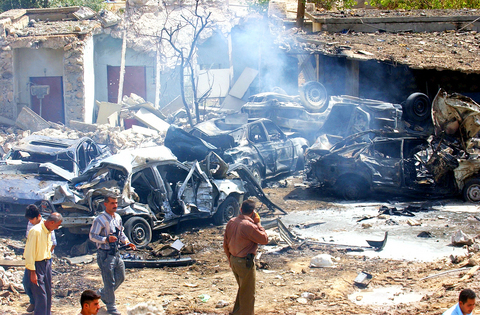A series of five bomb attacks -- including two suicide car bombings -- in Kirkuk yesterday left more than 20 people dead and nearly 80 wounded, police said.
Meanwhile, a series of near simultaneous mortar and bomb attacks in Fallujah killed four people and wounded 10 in the center of the city and led to a vehicle curfew throughout the city.
A suicide truck bomb exploded in the morning in the center of the northern city of Kirkuk, 290km north of Baghdad, killing 18 and wounding 55, said police Brigadier Sarhat Qadir. A few hours later, a suicide car bomb rammed into a joint US-Iraqi army patrol in the south of the city, killing at least three bystanders and wounding eight others, he said.

PHOTO: AP
Two roadside bombs later targeted police patrols in separate parts of the city. One killed two civilians and wounded four, while the second wounded three civilians, Qadir said.
Shortly afterward, a parked car bomb exploded near the house of a Waasif al-Obeidi, a Sunni sheik, killing one of his bodyguards and wounding eight people -- two guards and six bystanders, Qadir said.
Al-Obeidi, the deputy head of the al-Obeidi tribe, was not in his house at the time.
In the truck suicide bombing, a gunman in the truck opened fire on civilians before the vehicle exploded near the city's criminal court and the headquarters of two main Kurdish political parties, the Kurdistan Democratic Party and the Patriotic Union of Kurdistan, Qadir said.
The Patriotic Union of Kurdistan is run by Iraq's President Jalal Talabani, while the president of Kurdistan, Massoud Barzani, runs the Kurdistan Democratic Party.
Meanwhile, a roadside bomb detonated in the center of Fallujah, 65km west of Baghdad, followed a few minutes later by a car bomb attack and a blast from an explosives-rigged motorcycle in separate areas of the city. All three attacks targeted police patrols, police Lieutenant Mohammed Ismail said.
The attacks killed a total of four people, including two policemen, and wounded 10 others, including four policemen, he said. He would not provide details of which attack the casualties resulted from.
Shortly afterward, a mortar round hit the area of a US and Iraqi police base in the center of the city, and clashes erupted between gunmen and police nearby. Another mortar fell on an Iraqi army base in western Fallujah but did not cause any casualties, Ismail said.
Meanwhile, the bullet-riddled bodies of four unidentified men were found in separate neighborhoods in east Baghdad yesterday. All were blindfolded and had their hands and legs tied, the police said.

People can preregister to receive their NT$10,000 (US$325) cash distributed from the central government on Nov. 5 after President William Lai (賴清德) yesterday signed the Special Budget for Strengthening Economic, Social and National Security Resilience, the Executive Yuan told a news conference last night. The special budget, passed by the Legislative Yuan on Friday last week with a cash handout budget of NT$236 billion, was officially submitted to the Executive Yuan and the Presidential Office yesterday afternoon. People can register through the official Web site at https://10000.gov.tw to have the funds deposited into their bank accounts, withdraw the funds at automated teller

PEACE AND STABILITY: Maintaining the cross-strait ‘status quo’ has long been the government’s position, the Ministry of Foreign Affairs said Taiwan is committed to maintaining the cross-strait “status quo” and seeks no escalation of tensions, the Ministry of Foreign Affairs (MOFA) said yesterday, rebutting a Time magazine opinion piece that described President William Lai (賴清德) as a “reckless leader.” The article, titled “The US Must Beware of Taiwan’s Reckless Leader,” was written by Lyle Goldstein, director of the Asia Program at the Washington-based Defense Priorities think tank. Goldstein wrote that Taiwan is “the world’s most dangerous flashpoint” amid ongoing conflicts in the Middle East and Russia’s invasion of Ukraine. He said that the situation in the Taiwan Strait has become less stable

REASSURANCE: The US said Taiwan’s interests would not be harmed during the talk and that it remains steadfast in its support for the nation, the foreign minister said US President Donald Trump on Friday said he would bring up Taiwan with Chinese President Xi Jinping (習近平) during a meeting on the sidelines of the APEC Summit in South Korea this week. “I will be talking about Taiwan [with Xi],” Trump told reporters before he departed for his trip to Asia, adding that he had “a lot of respect for Taiwan.” “We have a lot to talk about with President Xi, and he has a lot to talk about with us. I think we’ll have a good meeting,” Trump said. Taiwan has long been a contentious issue between the US and China.

Japanese Prime Minister Sanae Takaichi yesterday lavished US President Donald Trump with praise and vows of a “golden age” of ties on his visit to Tokyo, before inking a deal with Washington aimed at securing critical minerals. Takaichi — Japan’s first female prime minister — pulled out all the stops for Trump in her opening test on the international stage and even announced that she would nominate him for a Nobel Peace Prize, the White House said. Trump has become increasingly focused on the Nobel since his return to power in January and claims to have ended several conflicts around the world,